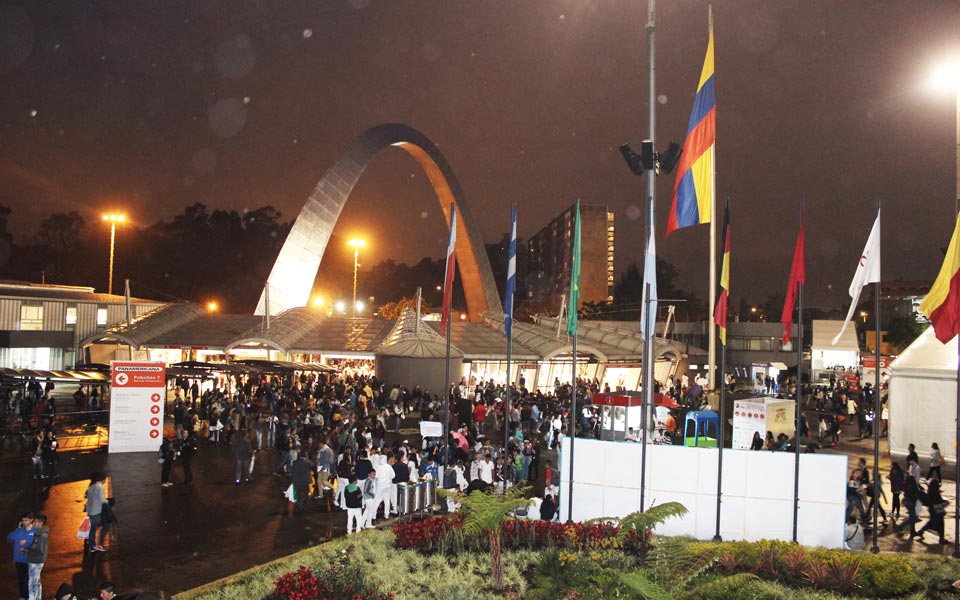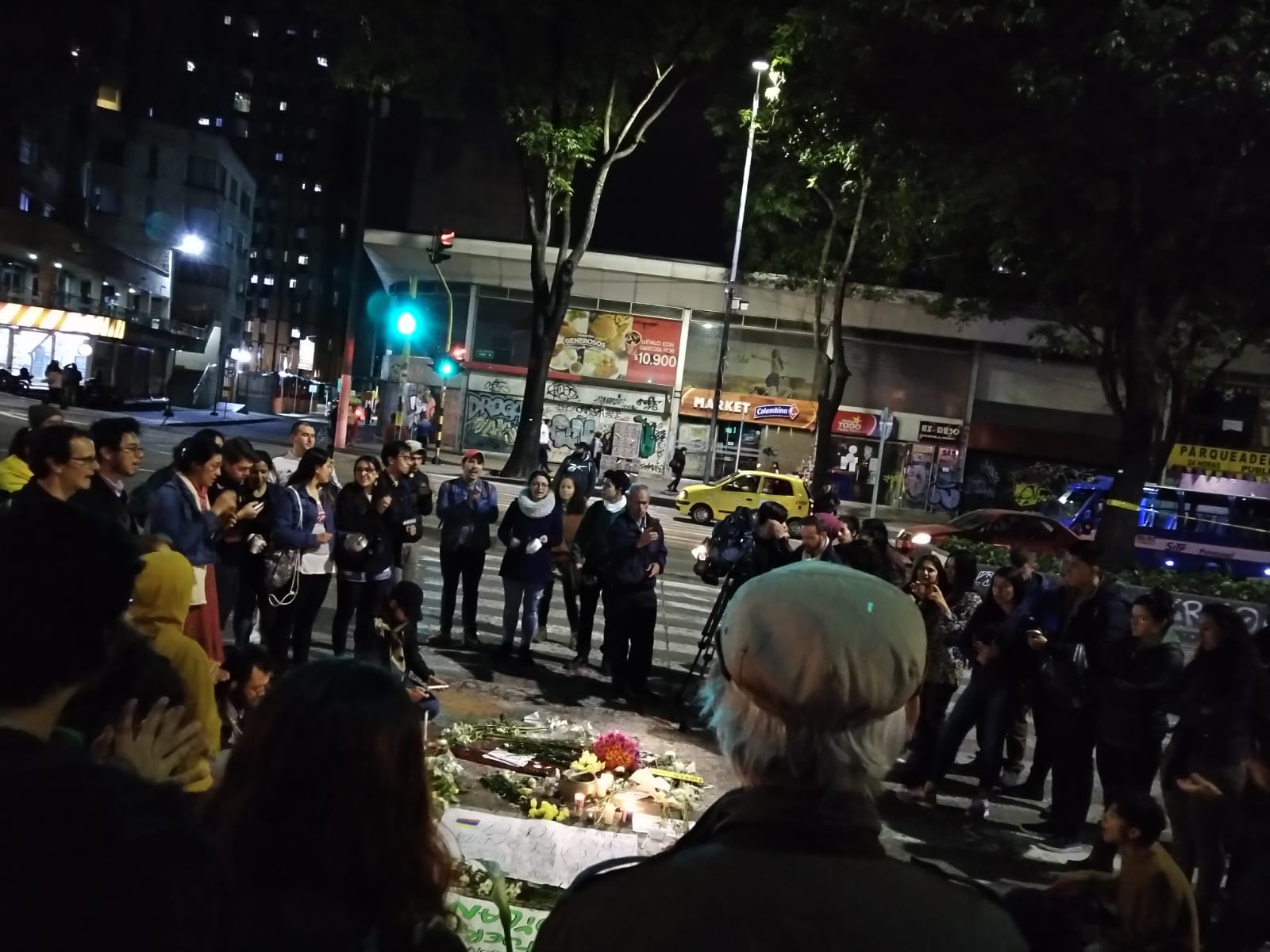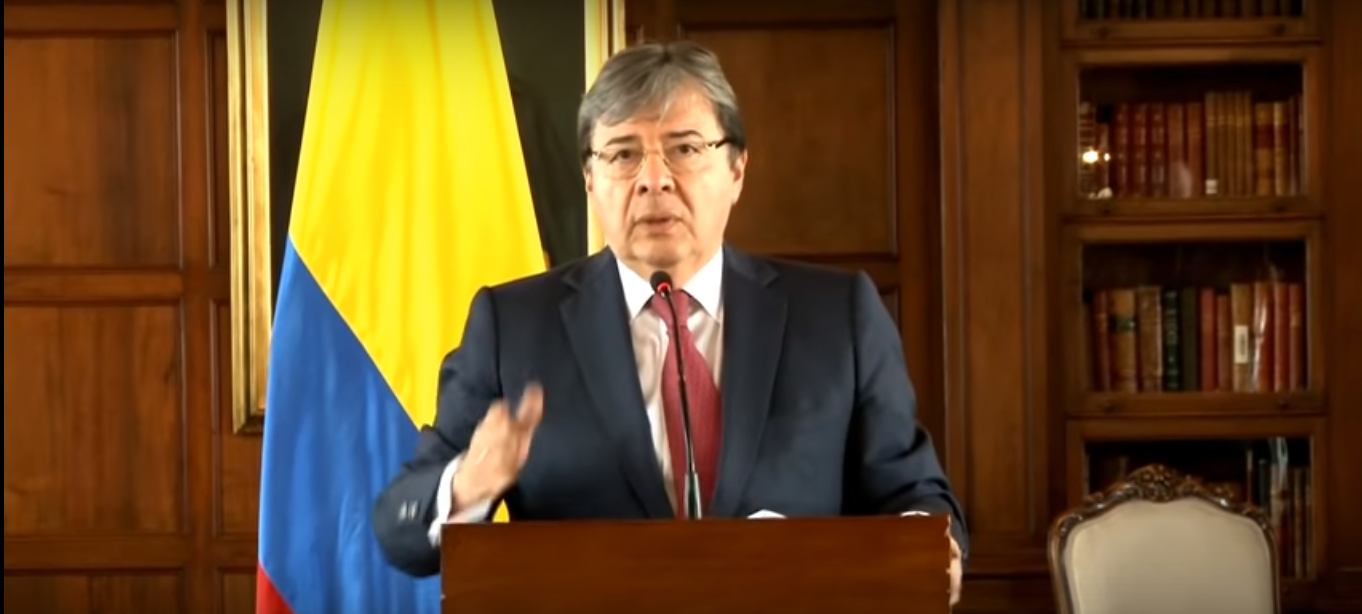Spray-can campaigners, famous for painting the ubiquitous pink crosses that mark Bogotá’s damaged streets, are running as tough-on-crime candidates for right-wing opposition party Cambio Radical in October’s elections. Crime is a big concern in Bogotá.
De Francisco (right) and Londoño (left) on the campaign trail. Photo courtesy of Eric Williams.
We went on the campaign trail with the Cambio Radical contenders: Nicolás de Francisco, candidate for the Bogotá Council, and Cristian Londoño, candidate for edil of Chapinero.
Known for shaming local authorities over the capital’s broken pavements and neglected public spaces, the civil protestors have won nicknames of ‘the Colombian minesweepers’ or ‘the X-Men’.
But now, running alongside Cambio Radical’s mayoral candidate, former police chief General Vargas, their approach to creating an “accessible public space” has shifted to promises about ramping up security measures and cracking down on crime.
Security and policing as the number one issue
Crime is right up there with transport in the concerns of rolo voters. According to de Francisco, Colombia’s capital urgently needs a rapid expansion of the city’s security forces, adoption of new facial recognition technologies into policing methods, and faster prison sentencing.
“Security is absolutely appalling in the city. What we are seeing in Bogotá is a completely unmanned police force”, de Francisco said.
In October, Cambio Radical is looking to replace incumbent Green Alliance party Mayor of Bogotá, Claudia López, with General Vargas. Making the case for the former director of national police, Londoño said: “at the moment the relationship between the Mayor’s office and the police is not close enough”.
Pointing to mayor of Barranquilla Jaime Pumarejo, Londoño claims the party achieves “better results” in government because it brings about “greater harmony and cooperation between politicians and the police”.
“Rather than seeing the police as a separate organ of the state, a Mayor should be acting as commandant”, Londoño continues.
Out on the streets
But the pavement painters’ close ties to security forces have sparked controversy. As we followed de Francisco and Londoño on the campaign trail, not all voters were happy to see them.
Last month, de Francisco’s team painted over murals of police violence victims, including memorials of those killed during the 2021 protests.
Two years ago, mass protests erupted against President Duque’s attempt at tax reform. The resulting crack-down by security forces left a high death toll, the figures of which remain disputed. The police response, condemned by human rights groups and still under investigation, occurred during General Vargas’ tenure as director of the national police.
Until August, commemorative portraits lined the Carrera Séptima near Avenida Chile, depicting victims like Cristian Castillo, a 26 year old killed by Colombia’s controversial and now rebranded ESMAD riot control forces. These were removed by the campaign, covered in their signature pink paint.
Whilst de Francisco has since stated that erasing memorials was not their intention and believes police should “respect human rights”, the incident has followed them with criticism online and in the streets. Over the course of our day on the campaign trail, interventions from passers-by made it clear that the pink paint’s neutral symbolism of civil protest has, for some, been tainted by the political baggage associated with Cambio Radical.
Corruption scandals and vote-purchasing allegations have dogged the Cambio Radical’s reputation in Barranquilla for years. The party is intertwined with the Char clan, whose candidate Álex Char will be the next mayor.
Álex was the previous mayor, too, and has been investigated over 100 times for corruption. Claudia López used him as an example when presenting her failed anticorruption bill in her time as a senator, so there’s no love lost there. Álex’s brother, Arturo, this week received an order for arrest related to vote-buying allegations.
Yet, it is also true to say that governance of the city, despite high rates of food insecurity and the lights literally being turned off does at least for now poll relatively well.
It is a different story in Bogotá, though, far from their traditional power base and far further to the left. The party holds just four seats on the consejo de Bogotá and Vargas is trailing low in the polls.
National issues
The Colombian minesweepers’ visions of security challenges facing Bogotá are also connected to their critiques of the national government, led by Gustavo Petro.
‘Total Peace’ plans of the Petro administration has seen Colombia’s first leftist government pursue a ceasefire with the National Liberation Army (ELN) armed group, as part of the ongoing peace process in the country.
Whilst Londoño and de Francisco agree that “all Colombians want peace”, they are critical of the security implications of Petro’s efforts.
“Peace has to be constructed with desire from both parties to give up arms”, de Francisco said.
“But we’re not seeing that”, he continued, “The ELN has no willingness to stop kidnapping, trafficking drugs, violating women, and recruiting underage children for war”.
The issue of Venezuela adds to the Cambio Radical candidates’ concerns. Bogotá has a large Venezuelan migrant population, who face plenty of obstacles in the capital. But integration programmes like ‘temporary stay permits’ have become a political football.
“We have to welcome the refugees in Bogotá with open arms”, de Francisco says, stating that “the Maduro dictatorship is violating human rights in every form”.
“But they also have to abide by Colombian laws. Some Venezuelans are coming here and doing things that are not legal. We have to be strict to enforce our laws upon them”, he continued.
Critical of excessive public spending
Both de Francisco and Londoño were educated at the famed Universidad de los Andes, and have training in finance, economics, and public administration. Before de Francisco went into politics, he worked in the capital’s stock exchange.
Many of their criticisms of the Petro government draw on this background and perceptions of Colombia’s economy. “We need to have a state that is optimized”, de Francisco says.
“Bogotá thrives on small businesses, but at the moment they are finding it really difficult to participate in the market because the barriers to entry are really high”, he continued.
“The problem is both the central and local government. They just promote tons and tons of regulations and new taxes. They never worry about promoting growth”, de Francisco adds.
A central concern for the Colombian minesweepers is the landmark labor reform proposal which the Petro administration is attempting to push through after over a year of legislative delay.
The updated version of the bill, filed last month by Petro’s Labour Minister Gloria Inés Ramírez, offers extensive structural changes to the country’s current system. Measures include plans to formalize contracts for informal workers like Bogotá’s gig economy delivery drivers, extend paternity leave, establish full pay for sick days and holidays, and make it harder for companies to fire employees.
“It will damage job creation”, de Francisco says, who has publicly described the proposals as “economic suicide”.
According to Londoño, small businesses in Chapinero are already struggling because of employee wage package burdens. For him, what the city needs are modest but targeted public subsidies for the area’s microenterprises.
Unlike the Pacto Historico, de Francisco argues he and his party will “create an entrepreneurial environment that acts as an engine for economic development in Bogota” if elected.
The answer to whether they will have the chance to do so will come at the end of next month when voters have the chance to put an X on their name as they do on paving slabs.





